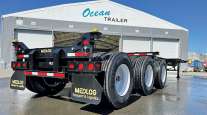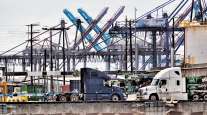Chassis Users Can Expect Higher Rates, Better Equipment, Leasing Execs Predict
This story appears in the Nov. 25 print edition of Transport Topics.
HOUSTON — Chassis users can expect higher rates, better quality equipment and no short-term resolution to the intermodal industry’s equipment challenges, top executives of the three largest chassis leasing companies said.
“Prices are going to continue to increase,” said Keith Lovetro, CEO of TRAC Intermodal, based in Princeton, N.J.
Direct ChassisLink Inc. CEO William Shea and Flexi-Van Senior Vice President Phil Connors echoed the sentiment during a joint presentation Nov. 19 to shippers and brokers attending the combined annual meeting here of the National Industrial Transportation League, Intermodal Association of North America and Transportation Intermediaries Association.
Chassis currently are provided by leasing companies, ocean carriers and railroads, along with some truckers. But leasing companies gradually have acquired a majority of chassis as some ocean carriers have moved away from providing that equipment to truckers at no cost.
Lovetro explained that costs will keep rising because of increased maintenance, inconsistent utilization and truckers who don’t pay for chassis as quickly as ocean carriers did.
Connors said delayed payments increase the time needed to collect payment by 40%, and Shea said some truckers are charging $25 a day for chassis that they now rent for $15 a day.
TRAC Intermodal; Direct ChassisLink, based in Charlotte, N.C.; and Kenilworth, N.J.-based Flexi-Van together own more than 80% of the marine chassis fleet — TRAC leads with 38%. They provide them to truckers through a variety of equipment pools and individual leasing arrangements, according to panel moderator Steve Rubin, principal at InterPro Advisory, based in Princeton, N.J.
“There continues to be more and more questions about what is happening in the chassis market,” said Rubin, also former president of TRAC, referring to ocean carriers’ shift from business.
“I don’t think anyone thinks this transition in the chassis business is going well,” he said, summing up difficulties with payments, maintenance and information systems.
Among those who are unhappy are truckers in the Intermodal Motor Carriers Conference of American Trucking Associations. Its executive director, Curtis Whalen, has complained about poor equipment and inadequate enforcement of a 2005 law designed to ensure truckers weren’t charged for chassis maintenance violations such as lights or tires that the provider should have fixed.
Shea’s company began the transition in 2009, when it was formed by the Danish company that owns the largest ocean carrier, Maersk Line. Direct ChassisLink began charging truckers an $11 daily rental fee for chassis that previously were free.
Since then, ocean carriers have sold most chassis, though as a group they still provide about 20% of the equipment to move some shippers’ freight. The ocean carriers include the chassis usage in the total rate to move the cargo internationally, but they pay the truckers separately for the U.S. highway move.
The three executives promised continued attention to maintenance improvements, as well as information system upgrades.
“We understand there is an improvement needed in data integrity,” Shea said.
“We are piloting different types of technology,” Connors added, including the use of a GPS on chassis. “The customer base is demanding to know a little more. We have to have more accurate data.”
Other changes include Direct ChassisLink’s converting a “big portion” of its fleet from bias ply to radial tires next year, Shea said.
Lovetro said TRAC is developing “an open-market pool model” anticipated to start in the first half of 2014. He explained that idea would refine the approach taken by the Consolidated Chassis Management pool, which was formed by ocean carriers in 2005 — it’s the largest equipment pool, and they still contribute some chassis to it.
Connors lauded pools as an efficient means for truckers to rent chassis today, but he added that prices will come down when lessors work directly with shippers whose freight is on those chassis.
He also endorsed the use of dedicated chassis fleets, saying that approach would lower costs, citing one such pool created for home improvement company Loew’s.
Shea supported a “portfolio” approach to future chassis supply, saying there could be multiple pools, including the North American Chassis Pool Cooperative operated by truckers.
Rubin, the moderator, asked the panel how long before the chassis sector resolves who provides chassis to motor carriers.
Connors said more than three years. Lovetro said it would take less than three years to iron out ownership, though it will take more than three years to determine the shippers’ role in the broad chassis picture.
Shea said “many years.”




